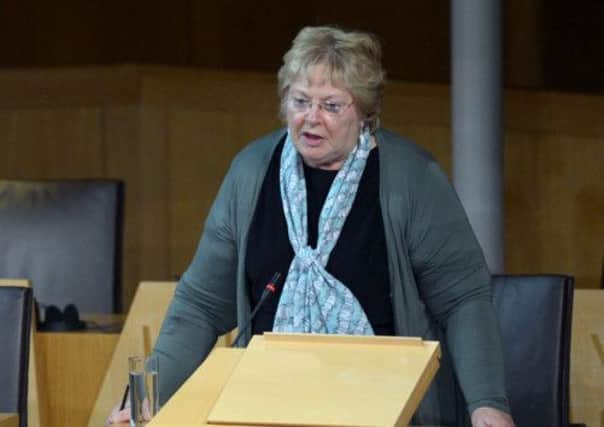Christine Jardine: Time has come for ‘right to die’ to become law


That second bill has now begun its journey through the Scottish Parliament and, although I was not elected, I intend to be true to my word.
I want to be clear at the start, however, that this is not about what I might want, or think is best. I know with some certainty that, faced with a terminal illness, I would not want to die.
Advertisement
Hide AdAdvertisement
Hide AdThat’s neither an empty claim nor one based on any religious commitment, although I understand the position of those for whom it is a theological imperative.
Shortly after that debate in Inverness two years ago, I spent several days in hospital recovering from surgery and waiting for the doctors to confirm whether or not I had a life-threatening illness.
I was lucky. But while I was waiting for this diagnosis, I discovered just how focused you can become on living. For me, supporting Margo MacDonald’s bill is about freedom of choice.
I do not have the right to deny others faced with a terminal illness or permanent paralysis the choice that they want to make, whatever it is.
Like many people, I have become much more aware of, and better informed about, this issue than I was when the independent MSP first raised it in the Scottish Parliament.
During the initial debate I moved from being someone who simply didn’t object to the bill, to being convinced of the rectitude of its basic principles.
Margo’s television documentary underlined my belief that I could never understand the pain that persuaded some people to choose to end their lives, and so should not judge.
But I could also understand why some members of the medical profession felt that, if the bill was passed, they could be placed in an impossible position.
Advertisement
Hide AdAdvertisement
Hide AdAnd despite my own certainty, I accepted that our politicians needed a set of absolute assurances before they could back such controversial legislation.
So, my position two years ago was probably best described as a “passive” supporter of the principle. In the two years since, however, the landscape of the discussion has changed. And so has my view on the matter.
Now I am convinced not just that I do not have a right to object to assisted suicide, but, further, that I have a duty to do what I can to win the freedom to choose that option for those that want it.
I am now more of an “active” supporter influenced by the very public debate which has taken place, mostly in England. We all witnessed the agony of Tony Nicklinson, a victim of locked-in syndrome trapped in a life he could no longer bear, whose attempt to win the legal right to die failed in the English Courts.
We have heard of a mother’s agony that her son, 42-year-old Andrew Colgan, who had decided to die after nine years of living with progressive multiple sclerosis, had to travel to Switzerland to end his life in a place he did not know rather than at home.
And we have seen the Commission on Assisted Dying, which was set up and funded in England by campaigners including Sir Terry Pratchett, claim that there is a case for assisted death.
Speaking to Margo this week about her new proposals, she was keen to flag up that change in awareness that had taken place, expressing the hope that her bill may benefit from it.
Those arguments we have seen played out in the news over the past two years will, she believes, have created a better public awareness of the debate. And, she hopes, greater public support.
Advertisement
Hide AdAdvertisement
Hide AdIn particular, she pointed to that case of Tony Nicklinson, a man she described as “being tortured at the end of his life, and for what good reason”, but whose suffering might have done an enormous amount to help those fighting to see her bill pass into legislation.
It’s a bill which, she says, is a simpler and better one this time around. It will deal with concerns raised by the medical profession about being asked to take an active role in the process.
It would be possible, if a doctor or nurse was comfortable with the idea, that they could be involved at the start of the process in assessing whether someone was suffering from depression, could be cured or was able to make a decision.
The legislation might also allow for a group, not necessarily from the medical profession, to be created to take responsibility for the later stage of the process. Humanists have already expressed an interest in what she is suggesting.
Even so, this most controversial of proposals will not win universal support. We have seen, again in England, the unwillingness of the courts to move away from the position, described in the judgment in Tony Nicklinson’s case, that: “voluntary euthanasia is murder, however understandable the motives may be”.
There are also those for whom their religious beliefs will always mean the idea is simply unacceptable. And there are many more who have fears that it could be open to abuse, regardless of how stringent the safeguards in place.
In the coming months, all of those arguments will be rehearsed in public. But hopefully they will not be confined to pressure groups on both sides.
This time, I hope people like me who want to see that right to choose a peaceful death enshrined in law are more vocal.
Advertisement
Hide AdAdvertisement
Hide AdOur politicians need to find out exactly how public opinion may have changed in the past two years. They may find that there is more support than they expect for giving us all the right to choose. • Christine Jardine stood for the Liberal Democrats at the last Holyrood election.